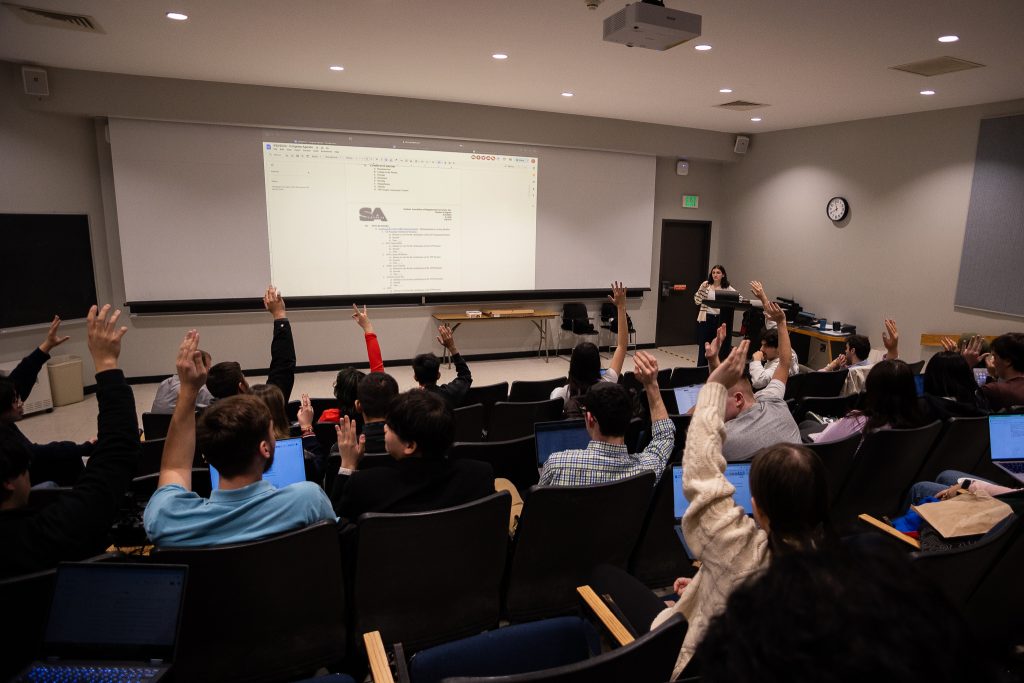In an official end to election season, the Student Association (SA) Congress voted to certify the results of last week’s SA E-Board and Binghamton University Council representative elections at their meeting on Tuesday night.
Representatives from all six residential communities and from off campus approved the unofficial results posted last week and announced the winner of the vice president for programming (VPP) race, which required a runoff election because of a “back-end glitch” that erased votes cast in the first two hours of the election. 1,705 students voted this year, a drop from previous years and a considerable change from pre-COVID-19 years, according to Benjamin So, the SA’s Elections and Judiciary Committee chair and a senior double-majoring in history and philosophy, politics and law.
After Sunday’s election, Atticus Fauci, a sophomore majoring in economics, was announced as the VPP election’s winner. He prevailed over two opponents — Siriki Doumbia, a senior majoring in business administration, and Ryan Miller, a junior majoring in English. In the first round of the ranked-choice election, he won 325 votes to Doumbia’s 246 and Miller’s 214.
“I spent the last week working with Campus Groups […] to try and recover data from the lost VPP election,” said So. “It went up the chain of command to the point where it went to Campus Groups’ central [office]. As in past, the B-Engaged office at [BU], they were unable to retrieve the data. That is the point of blank where we had to run a run-off election.”
In this year’s contested races, McKenzie Skrastins, the current SA president’s chief of staff and a sophomore majoring in mathematics, won the presidency with 708 votes. Caitlin McMahon, a junior majoring in accounting, won the vice president for finance race with 1,001 votes, while Krizia Yao, a junior majoring in philosophy, politics and law, won the election to become next year’s vice president for multicultural affairs. Luca Cassidy, the incumbent vice president for student success and junior double-majoring in economics and sociology, won reelection.
The races for both BU Council representative and executive vice president were uncontested. Mackenzie Cooper and Batia Rabin, both sophomores majoring in philosophy, politics and law, won their respective elections with 1,634 and 1,154 votes.
Some representatives raised concerns over the results’ validity, questioning So about the VPP election. Logan Blakeslee, an off-campus representative and a senior double-majoring in history and political science, shared his discomfort supporting the election results.
“I opposed certifying the results of the SA elections for two main reasons,” Blakeslee wrote. “The first is that the characterization of the errors in the VPP race as a ‘glitch’ was dishonest. I say with confidence that it was human error, and students deserve to know that. Secondly, multiple candidates had incumbent E-Board members campaigning on their behalf. One used her title while campaigning for a staffer in her own office. Another also campaigned for one of his own staffers. I saw this as a huge conflict of interest that ran contrary to the management policies and the election code.”
SA elections use a ranked-choice voting system, where students can rank candidates in order of preference, leave a vote blank or vote no confidence. In races with three or more candidates, candidates go through elimination rounds, where the candidate with the least first-choice votes have their votes redistributed to their opponents.
This is the second straight year SA elections have faced difficulties. Last year, the race for BU Council representative was redone when the Graduate Student Organization failed to use proper procedure in their election. The SA will continue to use B-Engaged as their official voting platform, because it is approved by University administrators.
Despite opposition, representatives overwhelmingly voted to approve all election results, and current E-Board leaders have begun to train their successors.
“The election has taught me a lot about my mental endurance,” Skrastins wrote in an email. “Throughout this process, I’ve found myself being pulled out of my comfort zone, but I’ve also found myself being able to face my personal fears and flourish. This has given me the confidence that I will be able to lead the SA in whatever is thrown at us next year.”



